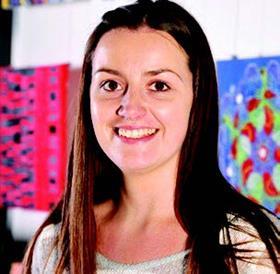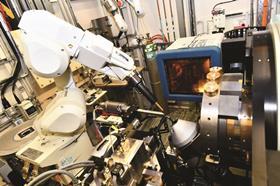Anna explains how she carries out her own cutting-edge scientific research at the UK’s national synchrotron science facility
What is a postdoctoral research associate?
A postdoctoral research associate is a position that follows on from a PhD (a post-graduate degree). The work involves research in a laboratory, as part of a larger research group that is managed by a senior researcher.
What do you do in your job?
My current role is to carry out novel research and publish the results I obtain. I am based at the Diamond Light Source, which is a synchrotron, or particle accelerator, which produces very high-intensity x-rays. We carry out a technique called x-ray crystallography, which allows researchers to obtain the 3D structure of a material at the molecular level. Scientists from universities visit to carry out the most exciting research. In particular, we look at protein molecules that may be found in your body. Once the shape of these protein molecules is known, new drug molecules can be designed to function better with these proteins.

My role here is to develop the equipment that these scientists come to use and to guide them in how to use it in the best way during their experiments. The equipment I develop aids in the experiments, but is also original so I publish the results I get from the developments.
My everyday activities involve building new equipment so that I can test it during experiments. We also maintain the equipment we already have and make sure that it is working efficiently for the university researchers when they visit. Each research group may only be allotted 8 hours to carry out their research, so we have to make sure everything is working correctly. A big part of my research is to publish results and then talk about this research at conferences around the world. This means that I always have to be thinking about the best ways to explain my research to others in presentations, posters and publications.
What do you enjoy most about your job?
I enjoy how varied my job is day-to-day. Although we’re always helping researchers from universities carry out their research, they always have very different projects with different requirements that we have to help with. It is also cutting-edge research that is carried out at Diamond, which is very exciting.
What attracted you to becoming a postdoctoral research associate?
During my PhD I carried out a lot of experiments at Diamond and enjoyed my time while there. It also seemed a great company to work for. As soon as I saw a job advertised at Diamond, although it was a short-term contract, I jumped at the chance as I thought it would be a great opportunity to get some experience.

How did you get into your job?
For my A-levels I took chemistry, biology and psychology. I then went on to do an MChem with Industrial Training degree at the University of Bath, a four-year degree where the third year was taken as training in industry. I continued in Bath, doing a PhD within the same group in which I had carried out my final year undergraduate project. While writing up my PhD I started a job at the Diamond Light Source, carrying out chemical crystallography. This was only a short-term contract, but it gave me a lot of experience within the company. The contract was extended and then I applied for a Postdoctoral Research Associate position within a different group in the same company, which is where I am based now.
What are the opportunities for career progression?
There are some options available for career progression at Diamond within your grade, and to the level above. For progression above this level, it is a case of waiting for a job to be advertised and applying for this.
What advice would you give for people wishing to enter your career area?
Experience is vital. It is a very niche area so the more experience you can get the better. During my PhD I had a lot of opportunities to visit Diamond and other similar facilities around the world. I made the most of my time on these visits to get to know the staff who worked there, and to ‘get my hands dirty’ while carrying out my experiments. Diamond also have summer studentships available for three months, which would be a good way of getting some experience.
First published 2013
Additional information
Students can find out more about work experience and placements at Diamond Light Source













